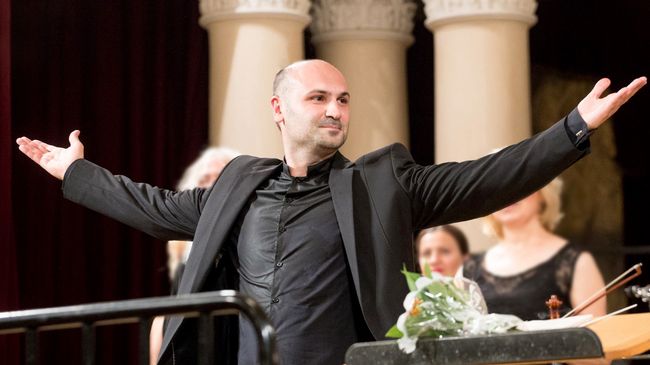Conductor Mikheil MENABDE: “This concert is an experiment”
Mystetsky Arsenal is to host a high-profile festival, Days of New Music in Kyiv, from December 11
Mikheil Menabde, a conductor at the National Philharmonic Society of Ukraine, a graduate of the National Music Academy of Ukraine (Roman Kofman’s student), answered The Day’s questions on the eve of the opening. The honor to open the festival befell his chamber orchestra Armonia Ludus and soloists of Kroiser Ensemble (Austria). The interview focused on the orchestra’s history, the principles on which the program of the opening concert is based, and on what is needed to get Ukrainian audiences interested in the new music.
“This is the first time my orchestra Armonia Ludus is opening a festival. I am excited,” Mikheil MENABDE confessed, “for when we cooperated with the music agency Ukho, we just played one of the cycle’s concerts. It is now a great responsibility for us because the music is absolutely new for us.”
Who hit upon the idea of a concert program, who and on what principle selected the oeuvres?
“It was a common idea – the festival organizers, its director Albert Saprykin, and we reached a consensus. We focused on Giacinto Scelsi’s Anahit. Scelsi is rarely played not only in Ukraine, but also the rest of the world. This is caused by many nuances because his music has not yet been fully revealed – there still are very many questions about the performance, interpretation, and understanding of this music. This concert is an experiment of sorts. So, with Scelsi in mind, we selected the other oeuvres which we consider topical from the viewpoint of stylistics, contrast, or our attitude to contemporary music. The project is titled ‘Days of New Music,’ although almost all the music we play is in fact classical now – it mostly dates to the 1970s. We chose works by Tristan Murail, Marc-Andre Dalbavie, Toru Takemitsu, and Giacinto Scelsi. I think that, even though they contrast in style and trend, this contrast is the right choice. We shall see the result during the concert.”
Would you tell us how the Armonia Ludus orchestra was formed?
“Armonia Ludus was being formed in a concrete situation, when I began to cooperate with the Ukho agency. They were organizing a festival of new music and suggested that I take part in this project and gather a small chamber orchestra for this festival particularly. So, we formed a team of good musicians from various orchestras of Kyiv, such as the Kyiv Chamber Orchestra, the Symphony Philharmonic Orchestra, and Kyiv Camerata. There are also some musicians who did not play in any orchestras. The debut was successful, and we began to be invited to various music events. This seemed to be developing quite harmonically. Our casts differ depending on the program – it is usually a strings chamber group with 20 people at most. If necessary, we involve other instruments. For example, we played Scelsi and Sciarrino, and there is a harp there. So, we invited a harpist, Valeria Tykhonova. I try to invite the same people, the ones we are in touch and have cooperated with. Why from different collectives? I want people, who have never played together before, to show teamwork. We have neither a budget nor a status. We work for a specific project and hold rehearsals, usually at the Philharmonic Society.”
Do you think new music has been in trend lately?
“Yes, music lovers have been in rapture over the new music projects in Kyiv over the past few years. This is largely the credit of the Ukho agency. It seems to me it is very important to know how to put it across to and get interested ordinary people. It is of paramount importance, especially here in Ukraine. This is not necessary in the West because, if I may say so, there is abundance there and audiences are yearning for something newer or want old things to get back. In Ukraine, however, although there are concerts of new music and the National League of Composers, which is doing so much good, there still is a need to get a wider circle of people interested in new music. As the Ukho festival of new music showed, people do attend and show interest in ‘complicated music’ events. It seems to me the point is in who organizes this and in their own attitude to what they are doing. They should know how to arouse interest and properly put it all across. What also matters is taste.”
Has anything changed in the National Philharmonic Society, as far as new music is concerned?
“They have some problems. The Philharmonic Society is a self-supporting organization, so it needs top-grossing performances. Our audiences usually come to hear classic things, very popular music, well-known players, etc. Sometimes well-known performers do not want to play new music – it’s not in their repertoire at all. Therefore, the Philharmonic Society’s administration focuses on classical music. This is not bad, but I think it would be a good idea to ‘dilute’ programs with something new. On the other hand, the Philharmonic Society is not only a symphony orchestra but a large organization with many goals to achieve. It comprises very many collectives that need to perform. The repertoire is formed within a year for the whole season. So, it is very difficult to give preference to new music only. They should perhaps find a balance and combine both things. We will have all this in due time.”
Newspaper output №:
№74, (2015)Section
Culture





